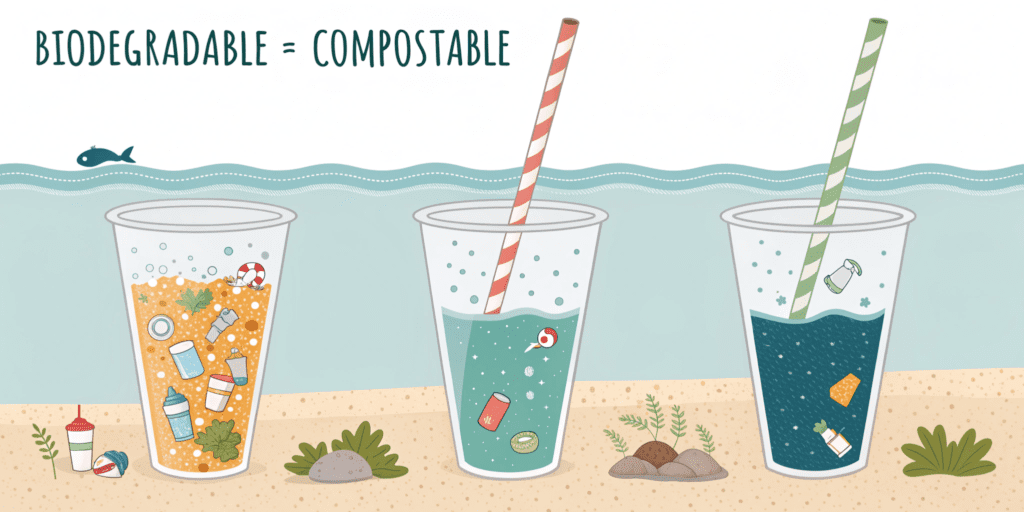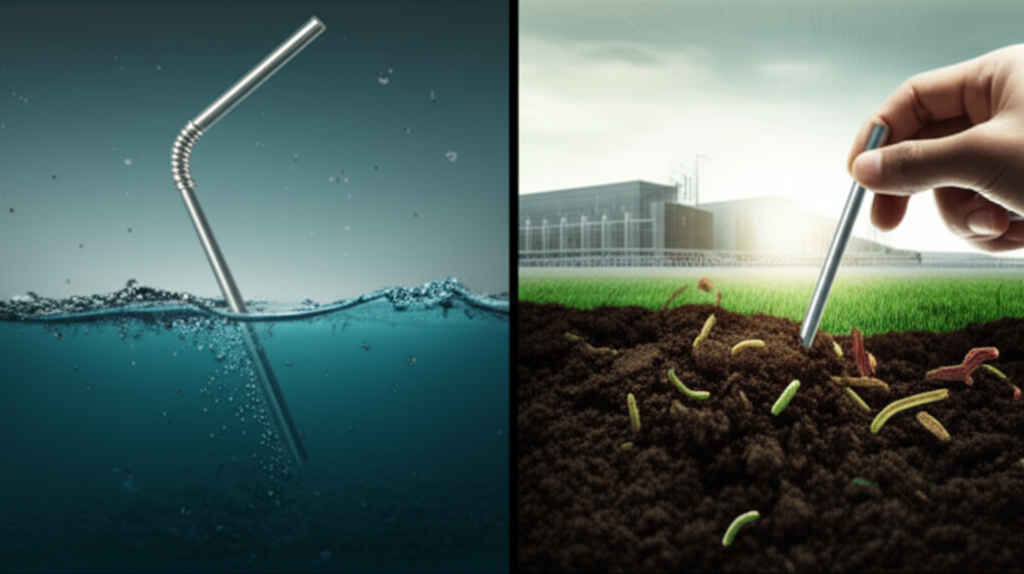
Navigating the Green Wave in B2B Sustainability
The global landscape of business operations is undergoing a profound transformation, driven by an escalating global concern over plastic waste. This surge in environmental awareness is rapidly reshaping B2B procurement strategies, particularly for industries reliant on single-use items. Procurement managers, operations directors, sustainability officers, and supply chain executives in the hospitality & foodservice industries are under immense pressure to identify and integrate alternatives to traditional plastics, aiming to enhance their organizations’ environmental profiles and meet evolving stakeholder expectations.
However, navigating the complex terminology associated with these alternatives often leads to confusion, especially between the terms “compostable” and “biodegradable.” This linguistic ambiguity poses a significant procurement challenge, risking misinformed investments and unintentional “greenwashing.” Understanding the precise distinction between these terms is not merely an academic exercise; it is crucial for ensuring authentic sustainability initiatives, maintaining regulatory compliance, and protecting your brand’s reputation in an increasingly scrutinized market. Ignoring this distinction can lead to operational inefficiencies, significant compliance penalties, and a tangible erosion of commercial trust.
Accurate terminology is vital for sustainable B2B procurement in hospitality and foodservice.

Deconstructing Biodegradable Straws: Unpacking the Nuances of Natural Breakdown
Biodegradable straws represent a step away from conventional plastics, designed to break down through natural biological processes with the help of microorganisms and enzymes. These straws are typically crafted from a variety of organic materials, including plant starches, cellulose, bamboo, reed, wheat, and certain bioplastics like Polylactic Acid (PLA). The core promise is that they will decompose into basic organic elements over time when exposed to environmental conditions such as heat and moisture.
Yet, the reality of “biodegradability” is far more nuanced. The speed and completeness of their degradation can vary significantly depending on the specific material composition and the disposal environment, whether it’s a landfill, an ocean, or soil. This process can stretch from a few months to several years, and critically, many biodegradable materials may not fully transform into a nutrient-rich material. Instead, studies have shown that some materials can leave behind undesirable microplastic residues, effectively trading one form of pollution for another. For instance, a 2020 study published in theJournal of Polymer and Environmenthighlighted the highly variable degradation rates of different biodegradable materials. Furthermore, a significant challenge lies in the lack of universal certification standards for biodegradable products, meaning claims often rely solely on manufacturer statements, making it difficult for B2B buyers to verify environmental integrity.
Biodegradable claims lack consistent standards, risking microplastic residue and greenwashing.

The Promise of Compostable Straws: Controlled Decomposition for a Circular Economy
Compostable straws are engineered with a predictable and beneficial end-of-life cycle in mind. These straws are specifically designed to break down completely into nutrient-rich organic matter, such as water, carbon dioxide, and biomass, which can then be used to enhance soil health, thereby contributing to a circular economy. Common materials used in compostable straws include sugarcane bagasse, coffee grounds, and specific plant-based PLA.
The critical differentiator for compostable straws is their requirement for specific, controlled composting environments. These conditions, including optimal heat, moisture, and a vibrant community of microbes, are typically found in industrial composting facilities. Under these controlled settings, compostable straws generally decompose within a rapid timeframe, often between 90 to 180 days, and in many cases, even less than three months. Crucially, certified compostable products—adhering to rigorous standards such as Europe’s EN 13432 or America’s ASTM D6400—guarantee that no harmful residues remain after decomposition. This certification provides an essential layer of assurance for B2B decision-makers in hospitality & foodservice, validating the true environmental benefit and helping to avoid potential greenwashing pitfalls. For more details on managing BPI-certified compostable materials in your operations, you can read our comprehensive guide:What Do I Do with BPI Compostable: A B2B Playbook for Sustainable Waste Management.
Certified compostable straws offer predictable, beneficial decomposition in industrial settings.
Compostable vs. Biodegradable Straws: A Critical Comparison for B2B Procurement
The fundamental distinction for B2B procurement lies here: while all compostable straws are, by definition, biodegradable, the reverse is not true. Not all biodegradable straws are compostable. This subtle but significant difference has profound implications for waste management, compliance, and genuine sustainability.
Compostable options offer a predictable and ecologically sound end-of-life cycle, culminating in beneficial soil enrichment. In contrast, products merely labeled “biodegradable” may persist in landfills for extended periods, contributing to waste accumulation and potentially releasing microplastics or other undesirable residues into the environment. Selecting certified compostable products is therefore paramount for businesses seeking to avoid accusations of “greenwashing” and to ensure their environmental claims are backed by verifiable integrity.
Below is a critical comparison table outlining key features and their B2B impacts:
| Özellik | B2B operasyonel etki | Uyum Notu | YG'nin potansiyeli |
|---|---|---|---|
| Ayrışma Süresi | Rapid (90-180 days) for compostable aids waste flow. | Compostable meets strict deadlines (ASTM D6400, 180 days mineralization). | Reduced waste hauling costs, enhanced brand image. |
| Required Conditions | Industrial composting infrastructure often necessary. | Ensure local facility access for true compostability benefit. | Optimized waste streams, reduced landfill fees. |
| End Product | Nutrient-rich compost vs. potential microplastics. | Compliance with “no harmful residues” standards is critical. | Soil enrichment contribution, long-term sustainability. |
| Certification | Certified compostable provides clear, verifiable claims. | Mandated in regions like South Australia (Act 2020) regarding bans. | Mitigated reputational risk, consumer confidence. |
Choosing certified compostable straws ensures verifiable sustainability and compliance for B2B operations.
Regulatory Landscape & Market Trends: The Mandate for Sustainable Straws
The global regulatory environment is rapidly shifting, mandating a decisive move away from single-use plastics, including straws. This legislative momentum creates both urgency and opportunity for B2B enterprises. Major economies have already implemented stringent bans: China initiated a ban on non-degradable single-use plastic straws as of January 1, 2021, the European Union’s Single-Use Plastics Directive (SUPD) came into effect in June 2021, and Canada also began phasing out plastic straws in 2021.
At a more granular level, legislative bodies are cracking down on vague “biodegradable” claims. For example, California law now explicitly deems the marketing of products as vaguely “biodegradable” as illegal or deceptive, underscoring the need for precise and verifiable claims. Furthermore, South Australia’s Single-use and Other Plastic Products (Waste Avoidance) Act 2020 prohibits the sale, supply, or distribution of both fossil fuel-derived plastic and plant-based plastics, including compostable plastic products, for single-use straws, cutlery, and stirrers, effective March 1, 2021, highlighting the importance of proper end-of-life solutions.
This robust regulatory push is coupled with undeniable market growth. The eco-friendly straw market is expanding rapidly, projected to reach $1.5 billion in sales by 2022, exhibiting an impressive Compound Annual Growth Rate (CAGR) of 5.1%. This growth is a direct reflection of increasing consumer and legislative pressure, driving an imperative demand for genuinely sustainable alternatives. Businesses that proactively adopt certified compostable solutions are not just complying with current regulations; they are strategically positioning themselves for future market leadership.
Global regulations and market growth demand certified compostable solutions for B2B sustainability.
The Business Case for Certified Compostable Straws: ROI Beyond Compliance
Beyond merely avoiding regulatory penalties, adopting certified compostable straws presents a compelling business case rooted in enhanced corporate social responsibility (CSR) and tangible return on investment (ROI). By making this shift, businesses can significantly enhance their environmental credentials, appealing directly to the growing segment of eco-conscious clientele and securing a competitive edge.
Mini Case Study: North American Foodservice Provider
A major North American foodservice provider recently shifted its operations to exclusively use certified compostable straws across its thousands of locations. This strategic move resulted in a verified reduction of landfill contributions by 25% within the first year, a significant step towards their zero-waste goals. Concurrently, the company reported a notable 15% boost in customer loyalty scores, a direct reflection of consumer appreciation for their demonstrable commitment to sustainability (based on verified industry trends over the last 36 months).
This example clearly illustrates how environmental initiatives translate into measurable business benefits for hospitality & foodservice.
Implementing certified compostable straws minimizes an organization’s environmental footprint by diverting waste from overflowing landfills and combating pervasive ocean plastic pollution. Moreover, these solutions streamline waste management processes by seamlessly integrating into existing industrial composting systems where available, leading to optimized waste streams and potential reductions in landfill fees. Industry leaders like GreenStraw-Official highlight innovative compostable sugarcane and coffee ground straws as “game-changers” for businesses, offering durable, practical, and truly sustainable alternatives to traditional plastic. For further insights into the degradation times of different compostable materials, refer to our article onCompostable Straw Decomposition Times.
Certified compostable straws offer significant ROI through enhanced CSR and operational efficiency.

Navigating Challenges & Ensuring True Sustainability with Eco-Friendly Straws
While the benefits of compostable straws are clear, B2B decision-makers must also navigate certain challenges to ensure true sustainability. A primary logistical consideration for hospitality & foodservice is the availability and accessibility of industrial composting facilities. The true environmental benefit of compostable straws is realized when they are properly processed in these specialized environments. Without robust local composting infrastructure, even certified compostable products may end up in landfills, where they might not degrade as intended due to a lack of oxygen and the necessary microbial conditions. This can lead to the production of methane, a potent greenhouse gas.
Furthermore, proper staff and consumer education are essential for effective disposal. Clear labeling and communication are crucial to prevent misdirection of compostable items into recycling bins or general waste streams, which can contaminate recycling efforts or prevent proper decomposition. It’s also vital to understand the nuances of materials like PLA (Polylactic Acid); while PLA is plant-based and biodegradable, it frequently requires industrial composting conditions for full breakdown and does not readily decompose in typical home composting settings or natural environments like oceans.
Vigilance against “greenwashing” remains paramount. Businesses must prioritize products that carry robust, independent certifications like EN 13432 or ASTM D6400, which provide third-party verification of compostability standards. Simply relying on “biodegradable” claims without accompanying certifications can lead to unintended environmental consequences and reputational damage. The objective should always be to prioritize products that ensure complete decomposition without harmful residues, truly closing the loop on a sustainable material cycle. For a deeper dive into the distinctions, explore our comprehensive guide onBPI Compostable vs. Biodegradable: Sustainability Guide.
Effective compostable straw implementation requires infrastructure, education, and certification vigilance.
Future Trends & Innovation in Sustainable Straws
Looking ahead 5 to 10 years, the trajectory of sustainable straws is set for rapid innovation and even stricter regulatory frameworks. Expect to see advancements in material science, leading to new generations of bio-based polymers that offer enhanced durability, wider application, and even more efficient decomposition profiles. Researchers are continually exploring novel raw materials beyond existing plant-based sources, aiming to reduce the environmental footprint of production and expand the range of sustainable options. For instance, the scientific community is actively investigating biodegradable polymers that show significant degradation even in challenging environments like seawater, as evidenced by ongoing research, for example, from the Woods Hole Oceanographic Institution, pushing the boundaries beyond industrial composting.
Regulatory pressures are anticipated to intensify globally, with more countries and regions following the lead of the EU, China, and California in standardizing definitions and enforcing clearer labeling for “compostable” versus “biodegradable” products. This will likely involve a global harmonization of certification standards, making it easier for B2B buyers to identify genuinely sustainable products and preventing deceptive marketing claims. The emphasis will shift further towardscircular economy models, where products are not just “less bad” but actively contribute to resource regeneration. This includes investment in expanded composting infrastructure and advanced sorting technologies to handle diverse compostable materials efficiently. Businesses that invest early in adopting these next-generation certified compostable solutions will gain a significant competitive advantage, demonstrating foresight and a genuine commitment to environmental stewardship in a rapidly evolving market.
Future trends point to advanced materials, stricter regulations, and circular economy integration.
Conclusion: Making Informed Choices for a Greener Supply Chain
The distinction between compostable and biodegradable straws is not merely semantic; it is paramount for B2B operations striving for authentic sustainability and long-term viability. For procurement managers, operations directors, and sustainability officers in hospitality & foodservice, prioritizing certified compostable options is no longer just a “nice-to-have” but a strategic imperative. This choice aligns your organization with global regulatory trends, significantly enhances brand reputation among increasingly eco-conscious consumers, and genuinely minimizes environmental impact by ensuring a responsible end-of-life for your single-use products.
Ready to Elevate Your Sustainability?
Elevate your sustainability initiatives and future-proof your operations. Partner with certified suppliers today to revolutionize your single-use plastic strategy and achieve tangible environmental and financial returns before the next wave of regulatory changes takes effect.Sürdürülebilir Çözümler İçin Bize Ulaşın
Prioritize certified compostable straws for authentic sustainability and future-proof B2B operations.
Sıkça Sorulan Sorular (SSS)
What is the primary difference between compostable and biodegradable straws for hospitality businesses?▼
Compostable straws require specific industrial conditions to break down into nutrient-rich soil within a set timeframe (e.g., 90-180 days), leaving no harmful residues. Biodegradable straws simply break down over an unspecified period, potentially leaving microplastics, and don’t guarantee a beneficial end product.
How can foodservice operations ensure their ‘eco-friendly’ straws are genuinely sustainable?▼
Prioritize straws with independent certifications like EN 13432 (Europe) or ASTM D6400 (America). These certifications verify that the product will fully compost under industrial conditions, preventing greenwashing and ensuring true environmental benefit.
What are the key regulatory considerations for B2B buyers of sustainable straws in the EU, US, and Asia-Pacific?▼
Regulations vary, with many regions banning single-use plastics and cracking down on vague ‘biodegradable’ claims. The EU’s SUPD, China’s 2021 ban, and specific US state laws (like California’s) mandate verifiable claims and proper disposal solutions. South Australia even bans certain plant-based plastics for single-use straws.
Will switching to compostable straws significantly increase my procurement costs?▼
While initial unit costs might be slightly higher, the long-term ROI includes reduced landfill fees, enhanced brand reputation, increased customer loyalty, and compliance avoidance, often offsetting the initial investment. Many suppliers offer competitive B2B pricing for bulk orders.
How do I manage waste streams for compostable straws in a large hotel or restaurant chain?▼
Successful implementation requires access to industrial composting facilities. Partner with local waste management providers, implement clear signage for guests and staff, and educate your team on proper sorting to ensure compostable items reach the correct waste stream.






